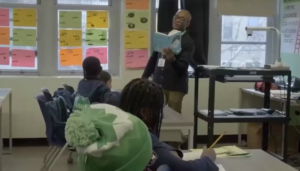02.13.25The Power of Read Aloud & Come See Us in Denver

Reading aloud to students creates the music of text for them…
In mid-March we’ll be in Denver leading a workshop on reading.
The workshop will incorporate content for our new book, The Teach Like a Champion Guide to the Science of Reading.
One of the themes of the book is bringing the text back into the center of the classroom. When we read together, from a book, during class, often aloud, we can bring the text to life and make the story compelling, we can socialize students to sustain their attention in text, we can practice fluency if students read, and model it if we read to them.
Check out these beautiful moments of Pritesh Raichura’s science class reading aloud—excerpted from the outstanding Step Lab documentary Great Teaching Unpacked for example.
Or this montage—from the book—of Spencer Davis, Will Beller, Emily DiMatteo, Jo Facer and Rob De Leon reading aloud with their classes.
Read Aloud, then, is a literacy tool that shouldn’t be overlooked, even among older students, we note in The Teach Like a Champion Guide to the Science of Reading.
Some other key benefits of doing what we see Spencer, Will, Emily, Jo and Rob doing.
Read Aloud can be an opportunity to share in, relish, and savor the beauty of books—one of the most joyful parts of the students’ and teachers’ day. It is also more critical to building fluency and preparing students to comprehend rich, complex texts than we originally understood.
A good Read Aloud allows students to access a text well beyond what they can read on their own, enabling them to familiarize themselves with more complex vocabulary, rhythm, and patterns of syntax.
Read Aloud also has the benefit of speed. A teacher reading a book aloud to students can cover more ground, more quickly, than the students themselves could if they were reading on their own, especially if the text is complex and challenging. In that case, the rate of exposure to key ideas, background knowledge, rare words, and technical vocabulary is accelerated.
Teacher Read Aloud also provides a model of fluent expressive reading for students. It helps students hear what language sounds like when read aloud with mastery and develop a mental model.
Developing such a mental model, will not only inform how students read aloud but also how they read silently. One of the core outcomes we seek as reading teachers is a sort of cognitive afterimage in our students when they read silently. We want their internal reading voice to be characterized by expression and prosody that bring the book to life during independent reading, thus enhancing meaning and perhaps pleasure.
Some details that we love about the clips in the montage.
- 90/110: Good read aloud is of done at 90% of your natural pace—providing students a bit more room to hear and process the words and information clearly but not so slow as to lose the story—and 110% expression—to build that mental model of expressive meaning making. You can hear that for sure in all of the clips
- Check for Attention: We want students locked in and listening and often reading aloud themselves. So it’s important that they have texts out and are following along. Quick call and response checks that they are with you can help. Spencer, for example, pauses to say “We were specifically told….” And students respond “not to go past,” proving they are locked in. Rob does something similar
- Circulate as you read: This lets you get near to students to observe them more closely and interact with them subtly if they need direction. It also somehow makes the reading a bit more dynamic.
- Feed knowledge: Emily very quickly explains that the phrase “in league” means “teamed up with.” Jo asks students to clarify who ‘her father’ was in Othello’s soliloquy.
- Shape Attention. It’s often helpful to give students something to “look for” such as “be on the look out for ways in which Squealer is scapegoating Snowball.”
We’ll spend two days “close reading” dozens more videos of teachers in action at the Reading workshop in Denver. Come join us! Details here: https://teachlikeachampion.org/readingreconsidered/mar2025
